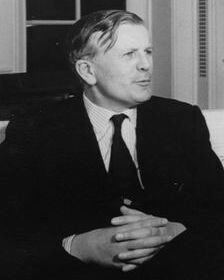1984
Our President in 1984/5 was:
The Right Hon. The Lord Grimond
He proposed the Toast to Sir Walter at our 77th Annual Dinner on Friday 1st March 1985 in The North British Hotel
Download the [transcript] or read the [bulletin]
Summary of the Speech:
Joseph Grimond’s toast was a richly reflective and deeply personal tribute to Sir Walter Scott, intertwining biographical insights, personal anecdotes, and commentary on Scott’s legacy.
Key Themes:
- Personal Connection:
- Grimond recalled boyhood impressions of Scott formed through visits to W. & J. Cook’s Edinburgh legal office, where two solicitors reminded him of Scott’s portraits.
- He admitted that his early mental image of Scott was incomplete and overly idealised.
- Scott’s Resilience and Attitude to Suffering:
- Despite personal tragedies—bereavement, bankruptcy, illness—Scott famously resisted self-pity.
- Scott’s sense of “good breeding” was defined as a mix of humility, courtesy, and self-restraint, qualities Grimond admired.
- Critique and Contrast with Modern Values:
- Grimond contrasted Scott’s stoicism and independence with modern dependency on state support, suggesting Scott would have rejected such “confinement.”
- He speculated that in today’s climate, Scott might have become a grant-funded academic rather than a self-made literary figure.
- Scott’s Political and Economic Ideals:
- While a Tory, Scott’s beliefs were rooted in personal freedom and patriotism, not authoritarianism.
- He admired Adam Smith and supported free banking, seeing it as key to Scotland’s growth.
- He opposed Scotland’s economic subservience to London and believed Scotland’s prosperity could be homegrown without needing devolution.
- Cultural Misrepresentation:
- Grimond argued Scott is wrongly pigeonholed as sentimental or Victorian.
- He praised Scott’s nuanced portrayal of the working classes and rural life—something overlooked by writers like Burns or 18th-century English poets.
- Scott’s broad influence included inspiration to artists, composers, and painters, though modern memory tends to focus too narrowly on “Balmorality.”
- Literary Taste and Honest Appraisal:
- Grimond admitted preferring Scott’s Journal, poetry, and Northern Tour over his novels, which he found hard to read.
- He praised Scott’s sense of duty in writing, even if the novels themselves are now more revered than read.
- Closing Reflection:
- The purpose of the dinner, he concluded, was not to grade Scott’s work but to celebrate his existence and enjoy fellowship—something Scott himself would have appreciated.
Noteworthy Points:
- Cultural Commentary: Jo Grimond’s remarks act as both tribute and critique—not just of Scott but of contemporary society and its departure from Scott’s values.
- Originality: He stands out from other speakers by challenging the canonical view of Scott and placing him within an Adam Smith-influenced economic and cultural framework.
- Humility: Grimond candidly admits not enjoying Scott’s novels, offering a more relatable and honest perspective than many literary tributes.
- Timeliness: His discussion of banking and economic independence for Scotland echoes debates that remain relevant in the post-devolution era.
Download the [transcript] or read the [bulletin]

Subsidiary Toasts
After the toast to the Queen had been honoured the Chairman proposed the toast to “The City of Edinburgh” to which Councillor Mrs Eleanor McLaughlin Deputy Chairman of the City of Edinburgh District Council replied.
The toast to “Her Majesty’s Forces” was proposed by Mr Lionel Daiches Q.C. and Air Vice Marshal J.F.H. Tetley Air Officer Scotland and Northern Ireland replied.
The toast to “The Chairman” was proposed by Mr Ivor Guild, WS.


